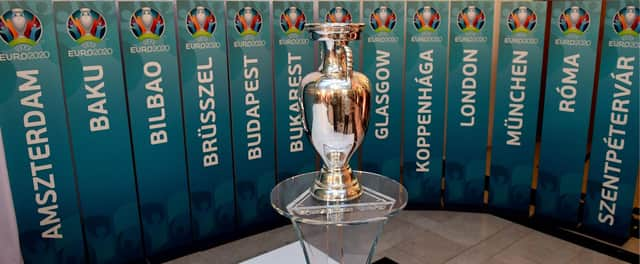Big clubs still call the tune as Euros play second fiddle


Faced with the impossible task of fitting in Euro 2020 and at the same time trying to untangle that mess of the club football calendar following the outbreak of Covid-19, Uefa made the right call to postpone its flagship international competition for a year to allow the 2019-20 club competitions to be completed, whenever that may be.
There was never going to be a final resolution from yesterday’s summit conducted via video calls, they were never going to be able to give a definitive date for the 2019-20 season to resume as nobody knows how the world will react to the pandemic in the coming months. But Uefa’s intention was to at least set sail in a certain direction, to help its member leagues and clubs prepare and plan, and they cast off yesterday, still into the unknown but intent on the current campaign resuming at a later date.
Advertisement
Hide AdAdvertisement
Hide AdAs Uefa president Aleksander Ceferin pointed out, Uefa took a big financial hit in turning Euro 2020 into Euro 2020+1, but probably not as much as a hit had it announced that the Champions League, which had just reached its juiciest stages, was to be scrapped.
A working group had been set up with the view to continuing 2019-20 at a later date.
How rosy those relationships will remain as the months tick by and we see the wider effects of the coronavirus on society remains to be seen. Then, perhaps, the real hierarchy of football will be exposed and we will see what takes priority over what.
Football is full of political disputes, competing factions, vested interests, backstabbing, deal-making. Where there is significant money there is power, and where there is power there is conflict.
Uefa made sure to exert its authority on proceedings in the public announcements. “We are at the helm of a sport that vast numbers of people live and breathe that has been laid low by this invisible and fast-moving opponent,” their Ceferin said. Adding later in his statement: “It was important that, as the governing body of European football, Uefa led the process and made the biggest sacrifice.” Euro 2020 was due to begin on 12 June in Rome and is now scheduled for next year from 11 June to 11 July, in the same 12 host nations, with Glasgow to stage four matches.
“We think postponing the Euro is the only (way) to get a chance to the national leagues and to all the club competitions to finish,” Ceferin said.
The European Championship final typically attracts a broadcast audience of 300 million worldwide and the 51-game tournament made Uefa a profit of €830 million (£756m) four years ago.
Ceferin estimated the cost of postponing the tournament at “hundreds of millions” of euros. Uefa reported reserves of €574.8m (£523m) in its annual accounts published this month.
Advertisement
Hide AdAdvertisement
Hide AdPlaying in June 2021 also takes match dates from other national team games for which Uefa already sold broadcast and sponsor rights.
Euro 2020 was scheduled to be played in a dozen countries from Ireland to Azerbaijan, and Russia to Italy. A one-year postponement became Uefa’s favoured option last week.
“The health of all those involved in the game is the priority, as well as to avoid placing any unnecessary pressure on national public services involved in staging matches,” Uefa said.
Completing domestic league seasons would allow titles to be awarded and decide entries for the next Champions League and Europa League. The first qualifying games are already scheduled for late June.
If resuming the season is possible, Uefa’s options to complete this season include playing quarter-finals and semi-finals as single games instead of over two legs where each team has a home match.
One option is for Champions League games in weekend slots. The Champions League final is scheduled for 30 May in Istanbul, but the Turkish city could also be asked to host the semi-finals in a mini-tournament at a later date. The likely last available date to play the final is 27 June.
In a coordinated move, Uefa was followed yesterday by South American football’s governing body CONMEBOL, which postponed the Copa America for one year to the same playing dates. It means the likes of Lionel Messi and Neymar would now be cleared to play for their European clubs if games resume this season.
June 2021 was occupied by the Uefa Nations League final tournament of four teams, plus the start of Fifa’s inaugural 24-team Club World Cup. It is due to be hosted in China and feature eight European clubs but no broadcasting or sponsor deals have yet been announced. In a statement, Fifa president Gianni Infantino said he was ready to ask China’s government and football federation to accept a delay of the Club World Cup. That means the tournament could be played later in 2021, or in either of the next two years.
Advertisement
Hide AdAdvertisement
Hide AdQualifying games for the 2022 World Cup in Qatar are also scheduled for June 2021 in most European countries. There is currently no space in the calendar to reschedule all those games, and a reduced qualifying programme will likely have to be considered.
However, any cuts in national team matches will impact member federations’ revenue and centralised broadcasting deals managed by Uefa.
Infantino said new dates for national-team games affected by the pandemic could be published at the end of April.